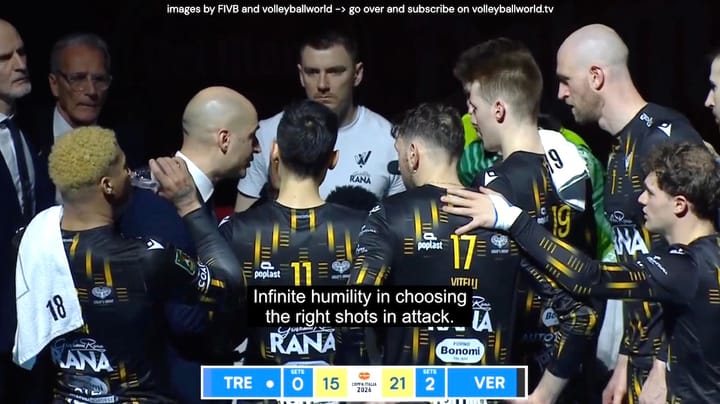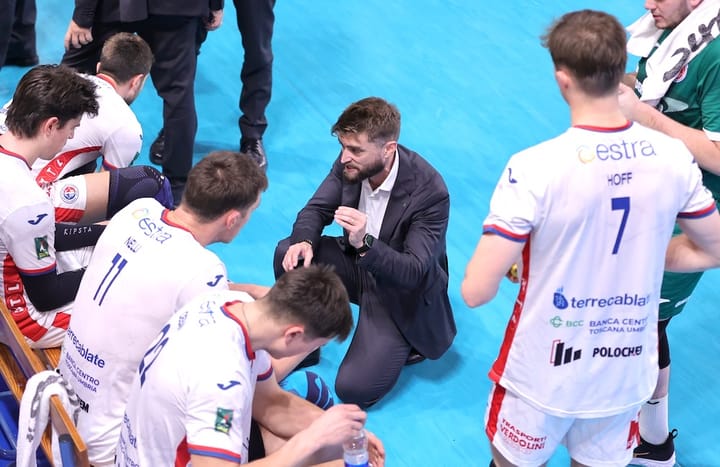85: Fabio Soli: Building Self-Regulating Teams (Part 2)
With Fabio Soli we continue our insightful discussion in Part 2 of our Masterclass interview.
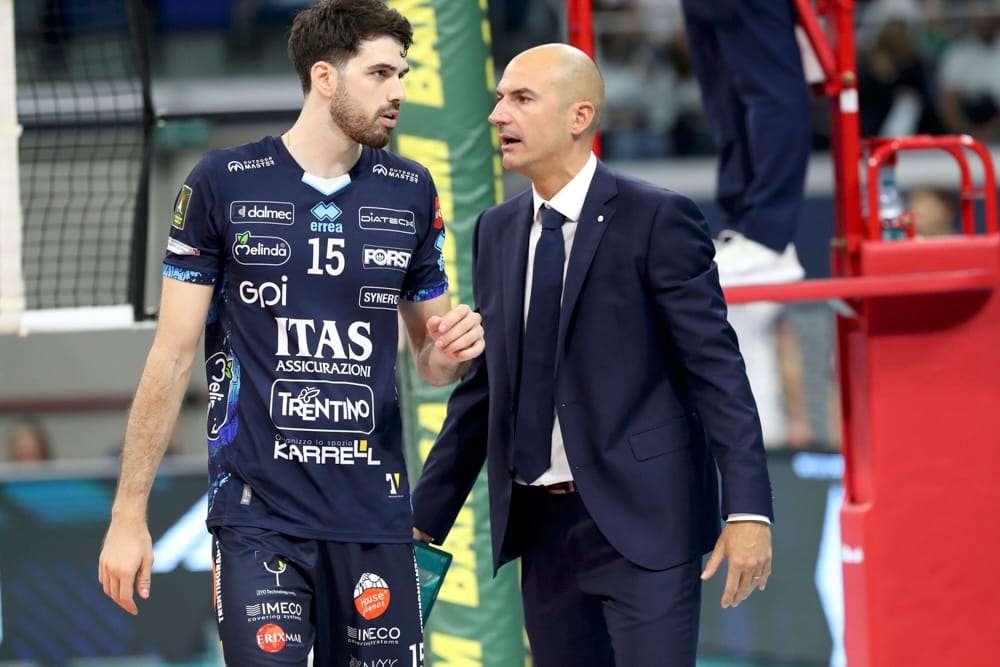
In May 2024, Trentino Volley, under the masterful guidance of coach Fabio Soli, clinched the European Champions League title with a commanding 3-0 victory over Polish powerhouse Jastrzębski.
This triumph in Europe's premier club competition, where the world's elite teams clash, marks a pinnacle in Fabio Soli's coaching journey.
Whether you're a coach, athlete, or any kind of leader, this interview offers precious insights into building successful teams, managing pressure, and maintaining peak performance while staying mentally healthy.
This honest discussion about personal struggles and growth provides valuable lessons beyond the volleyball court.
In our conversation Fabio delves into:
- Why volleyball is shifting from physicality to technical mastery
- How to build tactical systems while preserving player autonomy and trust
- The power of data-driven decision-making in modern volleyball
- Why strict rules might be hurting your team's growth and what to do instead
- How to handle overwhelming pressure in high-stakes environments
- The counterintuitive approach to leadership: embracing imperfection
- Essential insights for athletes transitioning out of professional sports
- and so much more
We have 30 minutes of transcribed and subtitled interview with coach Soli in this article. Enjoy!
Enter Fabio...
How do you organize your team's tactical system, and which factors influence your decision-making process? Plus (let's make this even more complex) how do you balance structure while maintaining player autonomy?
From the point of view of organizing how we play: I did a summer study on how teams perform - data that I've got out of our league play, the Champions League, and the national teams.
This is all data that's fairly easy to get. With that data in mind, you start to create your basic game concepts, which I then propose to my players: who plays the high ball, who's setting when the setter isn't there to set, how we cover, how we defend - always with a certain adaptable capacity that your players need to develop.
That's my starting concept. Then it is clear that in this starting concept, many variations can happen, so the important thing will again be, as I told you before, to give your players the freedom to read the game. It is clear that you have to have players who are able to read, adapt, and communicate.
This is something that, more than just training it in the gym, you create it in your relationship with them, continuously being in communication with them.
Who is responsible and can quickly adapt, who is in charge of covering the ball - this creates a different and necessary focus in the player, an ability to look differently at things, in communicating differently with their teammates.
The libero knows he's the one to go under the block to cover. But if he can't go there, he is the one who says "you go, I'll stay." It's all those things which are more about attribution of responsibility in reading and adapting, rather than organizing every single thing.
Then macro-situations, as I told you, get organized. For example, how to generally distribute sets in our side out, how to attack the high ball, who attacks the high ball. In my system, the high ball attack is almost exclusively for our P4's because opposites have lower numbers there.
Earlier I was looking at Slovenia-Serbia, with Stern who was attacking every single ball - second line, high ball, always scoring - so that is an adaptation to your system. But in principle, my players attack it in zone 4 because in zone 4 we have a better chance of replaying the ball. We have more chances to score the point. All that comes out of a whole series of data which I share with the team.
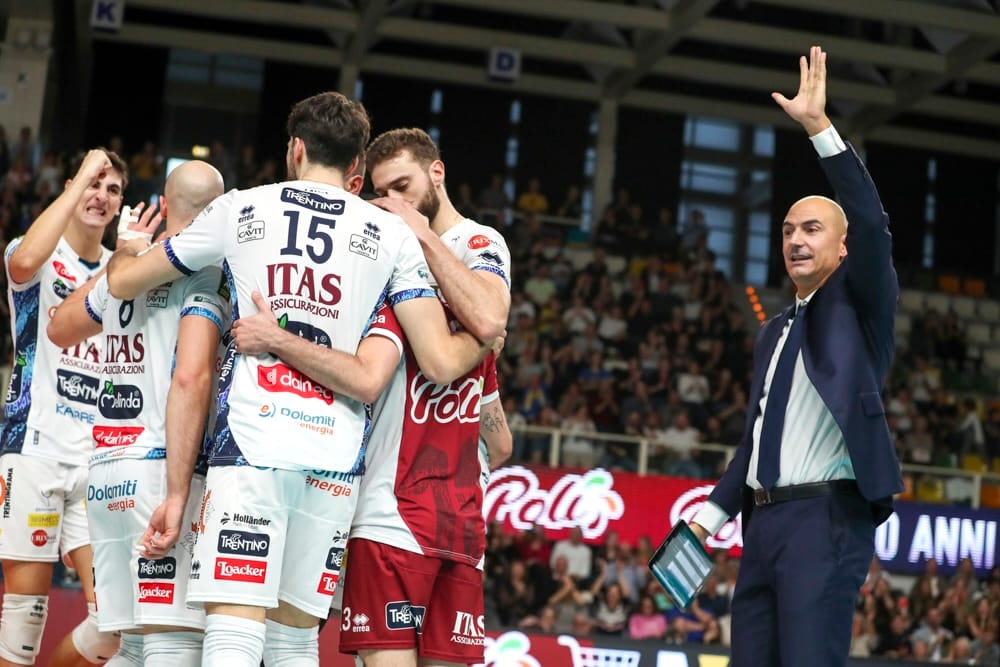
So you create a base of play, which I think everybody is doing. With this base concept, you cover every macro-situation, stimulating the players to have that spirit of adaptation that I was telling you about.
Then there is the part about rules. I want the group to be self-regulating. So in the past, I have asked my team to compose their own set of rules. It happened to me, for example, last year, to give a lot of freedom to my players.
In the end, the only real rule I ask for is respect for the team.
If I arrive late and you arrive on time, I am disrespecting you because you got up earlier, you got in the car before me, said goodbye to your family before me. You arrived at practice 15 minutes early instead of at eight o'clock and one minute late.
So I try to stimulate that, respect to what is the essence of being a team. But if you're late because there was an accident in front of you, what justice is there in bringing pastries if that happened, compared to bringing pastries if you overslept? Since the player can make up whatever they want, I prefer that they themselves make up their own team rules. That it is their own internal thing because I think many situations are easier to solve while managed internally.
I ask a lot from the key players inside of my team - who is not always just the captain, sometimes they are also key players who maybe never play; however, inside the team they have authority. When they open their mouths, they are respected. So I try very hard to give this kind of power to the team, to self-regulate.
Clearly, when I see that disrespect is reiterated, if it repeats itself, it is no longer a question of 'with a rule it wouldn't have happened'. It is an individual matter of a single player, which is then treated in an individual matter - individually together with the club, individually together with the captain, individually in front of the team. This I believe is more useful and more functional.
Like that, the player perceives that they are empowered, they perceive that they can have confidence in managing being the professionals that they are.
If they mess up once, in my opinion, they'll probably carry that guilt themselves. We had a player, last year, who was late and felt so bad that he had disrespected the team. He knew he didn't need to bring pastries or whatever, but he looked bad in front of his team. That's the entire concept: team respect is more powerful than bringing a few pastries or paying 50 euros.
And that's the way to go about this, in my opinion. So about rules: either the team wants them and they create their own rules, but I prefer to trust in my athletes and getting it wrong once in a while.
I would rather give trust and be betrayed. I'm able to handle that situation best.
I gave my trust, and you messed up. Now it became a card I can pull on you. Starting out with a set of rules just shows that I don't trust them and that they have to prove to me that they are an adult, that's not the way to go.
What habit has most improved your life in the last five years, and what do you do when you feel overwhelmed or unfocused?
I see a lesson in there of something I learned thanks to working in sports, something I didn't have as a player, the ability to be more serene.
Not that I live serenely through difficult times, no. But I live them more peacefully, compared to some time ago, when I really suffered.
In the past, as a player. I was physically feeling the stress, the fear of failure, defeat. I was really physically sick. I didn't go to dinner with my teammates. I went home because for me losing meant that I deserved to be punished.
So I had to learn not having to be perfect all the time. Embracing fallibility has given me much, much more serenity.
The ability to ask for help is a very important achievement. I thank volleyball for figuring that out.
Also letting go of things over which I have no control - if there are things I see not working, where I perceive that I don't have any possibility to intervene, I learned not to go crazy there. My experiences abroad taught me that. So many things were happening but they were out of our control. This was about the president's affairs of my former Turkish club. There I learned to let stuff go. Because if they don't depend on me, if they don't depend on us, however it goes, we cannot affect those things.
And it whouldn't become a burden on the other things where I can act have an impact, on which I can intervene, improve, choose, decide. That's an achievement of mine. Then about imperfection, fallibility, call it what you will - everything is improvable but nothing can be perfect. There is someone who is stronger than you, there is someone who plays better. Not always everything depends on you.
So the tendency to always achieve something, the challenge, the improvement, to be a better person, player and coach every day - with the knowledge however that we could never be perfect. And the asking for help. These are the things that in my work, in my career became important.
Not being blind to difficulty, but confronting a player with something, trying to find a solution together. That is the exact opposite of failure, figuring stuff out together. Doing it together doesn't mean you'll loose authority. But it is a very powerful thing, it's a very strong thing if approached with the right person in the right way.
These are the things I had written down: To seek advice. To identify a person who can lend you a hand, give advice, with a different point of view, who can clear up your current situation where you are maybe losing sleep. They show you a different way, with a different perspective. Even maybe a perspective completely out of this world, but someone who can give you a push in your back.
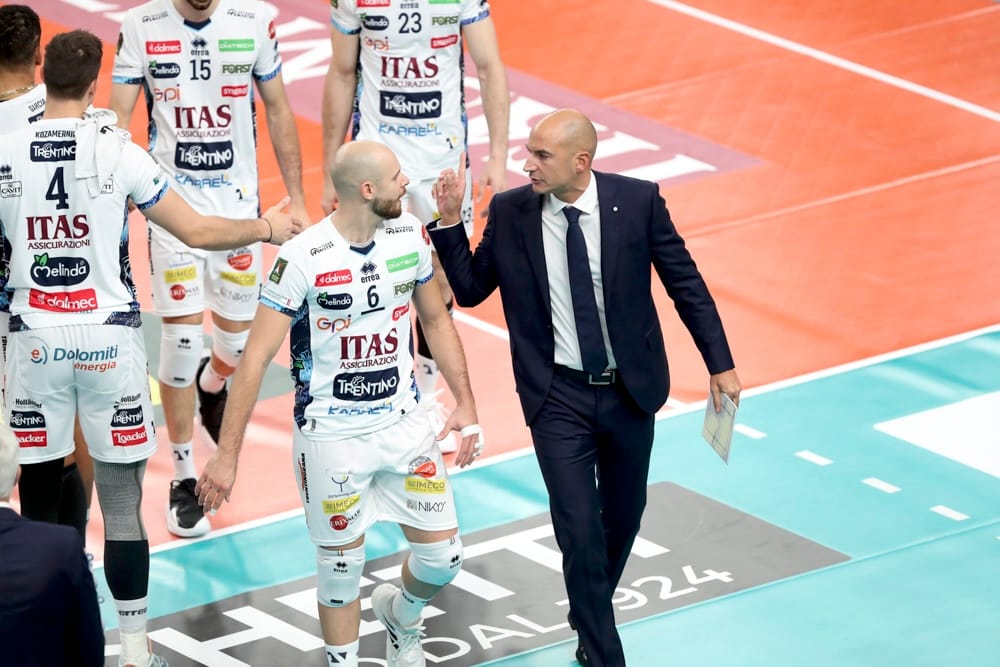
Because the tendency of us coaches is to always focus on the same things, right? You always see them the same way. That's why for example, I really like to have every year a new person on our staff.
Don't go around with the same people all the time, because then eventually their eyes become yours.
And so I like to change, even walking into the unknown sometimes.
Last year I got an assistant coach who I had never worked with. I think I have that small talent of being able to sync up with people quickly. When I get that feeling going, I know we can achieve something - they with me, and I with them. And together we can do something important. Because otherwise I would have had a staff who had already been here for a long time, where everything had stayed the same. I am convinced that something new is needed regularly.
